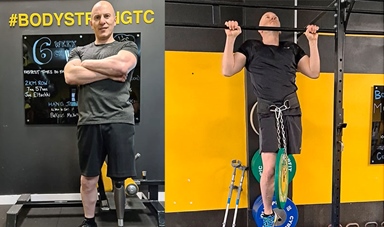Loading component...
At a glance
By Katie Langmore
Different motivations compel people to volunteer their time with charity organisations. For many, it is the desire to give back to their community. For others, the calling is more personal.
When public practitioner Bakous Makari CPA visited a doctor with leg pain 11 years ago, he did not expect to be told that he had a rare form of bone cancer and may only have a few months to live.
Makari made the tough decision to remove the cancer and have a full leg amputation, in the hope this would save his life.
“If you’re lucky enough to catch this cancer early, you can amputate. It was the only way to eradicate the cancer,” says Makari. “Even so, there was only a 30 per cent chance of survival after amputation.”
Makari lost his leg from the hip down, leaving him with a heavy, cumbersome prosthetic to carry that requires both his physical and mental strength.
“Anyone who has had an amputation is never the same. I was living in fear for a while – not knowing if I would survive the cancer. If I did, I was told by my doctor that I would be confined to a wheelchair for the rest of my life.”
However, Makari says he never gave up hope and was determined to live fully. “I didn’t allow adversity to completely change my life.”
In the months that followed his amputation, Makari learned to walk with his prosthetic and returned to his accountancy practice, Makari and Co.
By 2012, he was feeling driven to find a platform through which he could give back to the community and help others overcome adversity. Makari successfully stood for council elections with the City of Parramatta and, by 2015, he was deputy lord mayor.
Makari cites both his experience with adversity and his years of experience in accounting as useful tools for his work with his local council. “If you’re elected into a role like that, you should have some form of skill that can support the organisation and the community that you serve.”
During his tenure as deputy lord mayor, Makari visited the Children’s Hospital at Westmead’s oncology department to share his story of hope with the young cancer patients and their families, and to meet with medical researchers.
Inspired by their work and eager to help, Makari homed in on a fitness challenge at his local gym. “I immediately saw it as a way I could help encourage those with a disability,” he recalls.
Makari set up a fundraising profile with the Children’s Medical Research Institute – enabling supporters to directly fund children’s cancer research – and was soon undertaking six weeks of gruelling physical challenges alongside 40 able-bodied participants.
Remarkably, his post-operative years of strengthening both mind and body paid off, and Makari won the challenge.
“There was a lot of goodwill from the community. I raised close to A$60,000,” he says, adding proudly that every thousand dollars raised supports the Institute for two more days of research. “Those two days could be the difference between saving a child’s life and them dying.”
Makari still goes to the gym regularly, finding it crucial for both his physical and mental wellbeing. “Going through something as severe as the amputation can be a very lonely experience, so I find it’s really crucial to stay healthy and fit. It helps alleviate the daily stresses of life.”
He remains passionate about finding ways to reach out to people with a disability or those facing adversity, and to inspire hope and courage. “Through motivational speaking or any other way that I can help, I’m there.”
The Children’s Medical Research Institute (CMRI) is a Sydney-based independent organisation. The CMRI’s more than 170 scientists are committed to finding treatments and cures for serious conditions affecting children. cmrijeansforgenes.org.au

